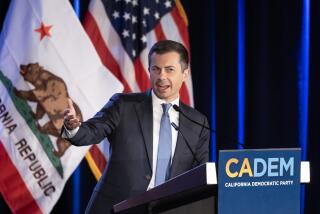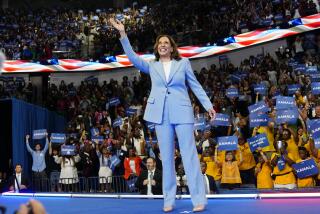Dukakis Holds Slight Edge In Early Colorado Returns
- Share via
DENVER — Massachusetts Gov. Michael S. Dukakis jumped to an early lead in Colorado’s Democratic presidential caucuses Monday night, moving ahead of the Rev. Jesse Jackson in test precincts in almost every region of the state.
Preliminary results released by the state Democratic Party showed Dukakis leading Jackson solidly in county convention delegates but in a tight race in the non-binding beauty contest in about 70 pre-selected test precincts.
Despite a major effort here, a third Democratic candidate, Tennessee Sen. Albert Gore Jr., barely registered support in the preference poll or delegate selection.
On the Republican side, Vice President George Bush continued his steady march to the nomination, easily swamping rival Pat Robertson. With 83 precincts reporting, Bush had more than 80% of the vote, with less than 8% for former religious broadcaster Robertson.
“The trend is overwhelming for Bush,” said state GOP spokesman Lauren Lehman. “These numbers will hold.”
With more than 2,700 precincts across the state, Democratic Party officials chose 130 test precincts in the state’s six congressional districts for initial reporting of results. Complete caucus results will take two days, officials said. The state party said it kept the list of test precincts secret from the campaigns to avoid having any campaign focus special efforts on those precincts.
“Dukakis is ahead on delegates but it is very close on the preference poll, particularly in Denver,” said Buie Seawell, chairman of the state party and a Dukakis supporter.
Alice Travis, national political coordinator for the Dukakis campaign, offered cautious hope about the early result. “It’s early but if it holds it looks pretty darn good,” she said.
Colorado traditionally has little effect on the nomination process. But this year, the caucuses in this sprawling mountain state have drawn the national political spotlight because of the neck-and-neck battle between Dukakis and Jackson. Moreover, the results here may affect voters in the larger and more important Wisconsin primary today.
The caucuses were only the first step in a complex, four-part process that eventually will send 45 delegates to the Democratic National Convention in Atlanta. Six uncommitted “super-delegates” are already chosen. Republicans will send 36 Colorado delegates to their convention in New Orleans.
Registered for Two Months
Democrats and Republicans gathered separately in living rooms, church basements, fire stations and other sites in the state’s 2,784 precincts beginning at 7 p.m. Only voters registered for at least two months could participate.
Although each party has more than 600,000 registered voters, officials expected only about 20,000 Democrats and about 23,000 Republicans to attend the caucuses. Weather was not a problem: The day featured 60-degree temperatures and a blazing sun under azure skies in the Denver area.
But college basketball was. In addition to political apathy, campaign aides said they fought a losing battle against the nationally televised National Collegiate Athletic Assn. championship game between Oklahoma University and the University of Kansas.
“Who’s going to attend the caucuses?” asked Jim Monaghan, an independent Democratic political consultant and former state official. “Whoever’s not interested in basketball.”
Campaigns feverishly called thousands of supporters all day Tuesday to advise where to go and what to do. “Everyone’s on the phone getting their people out,” Jennifer McGuire, a Dukakis spokeswoman, said late Monday.
Bill Cosby Ads
The three Democratic candidates and both Republicans campaigned in the state, and Dukakis and Jackson aired TV spots. Illinois Sen. Paul Simon did not participate in the state’s caucuses. The Democratic race pitted Jackson’s grass-roots campaign and Bill Cosby ads, against Gore’s 15 full-time paid staffers and appeal to rural voters, versus Dukakis’ endorsement by Seawell and popular Gov. Roy Romer.
“The party structure, the chairman of the party, the governor and most of the mainstream activists are supporting Dukakis,” said Monaghan, who has not endorsed a candidate. “The allegiance is more to the person who is likely to be the nominee than any strong ideological reason.”
Although blacks account for only 4% of the voters, state party officials said Monday that Jackson’s fiery, anti-Establishment message was appealing to many whites who formerly supported their favorite son, former Sen. Gary Hart. Hart, who remains popular in the state, campaigned with Jackson over the weekend.
Jackson and Dukakis campaigned hard for the state’s Latino voters, who make up about 20% of the Democrats. On Sunday, for example, Jackson preached an emotional Easter sermon at Our Lady of Guadalupe Roman Catholic Church to more than 1,000 people in a heavily Latino neighborhood.
Latinos Recruited
Dukakis, who spoke Spanish while campaigning here Saturday, tried a different tack. He recruited high-visibility Latinos for top campaign positions. State campaign director David Villarino and Western states director Richard Ybarra are both sons-in-law of popular labor leader Cesar Chavez and are organizers in his United Farm Workers union.
Dukakis and Bush supporters complained that the Easter weekend made it more difficult to organize supporters. Jackson, on the other hand, preached in two crowded churches on Sunday, and aides said ministers in at least 30 Colorado churches asked their Easter congregations to attend caucuses for Jackson.
It was unclear whether Colorado’s caucus system would clarify or confound the national Democratic race. Caucus-goers in some precincts first vote in an unofficial straw poll to ensure that candidates have at least 15% support, the minimum threshold for delegates. All Democratic precincts then hold an official but non-binding presidential preference poll.
County Conventions
At that point, caucus-goers elect delegates to county conventions, which will be held from April 14 to May 2. Some use secret ballot, others a voice vote. Turnout will not affect the number of delegates each caucus may elect.
Six congressional district conventions will follow, in which 29 national delegates will be chosen. Another 16 will be chosen at the state party convention on May 21. Those 45 will then join at least six “super-delegates” at the national convention in Atlanta.
More to Read
Get the L.A. Times Politics newsletter
Deeply reported insights into legislation, politics and policy from Sacramento, Washington and beyond. In your inbox twice per week.
You may occasionally receive promotional content from the Los Angeles Times.










